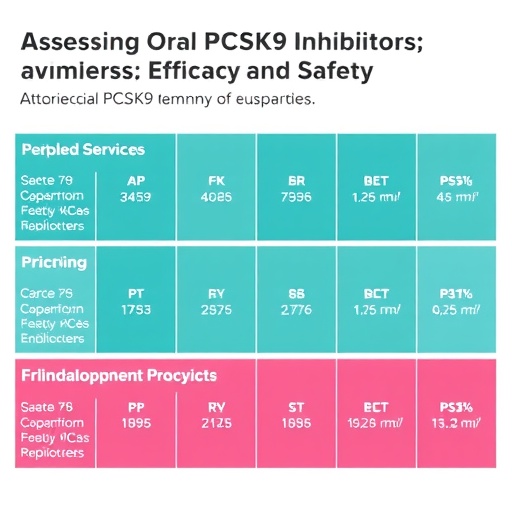Proprotein Convertase Subtilisin/Kexin Type 9 (PCSK9) inhibitors have emerged as one of the most promising classes of treatments for hyperlipidemia, particularly in patients who are resistant to traditional statin therapy. A systematic review and meta-analysis conducted by Masson et al. sheds light on the lipid-lowering efficacy and safety profile of oral formulations of these inhibitors. The findings from this comprehensive study are expected to shift the paradigm of cholesterol management in patients at high risk of cardiovascular diseases.
The primary function of PCSK9 involves the regulation of LDL (low-density lipoprotein) receptors on the liver’s surface, which play a crucial role in diminishing blood cholesterol levels. When PCSK9 binds to these receptors, it promotes their degradation, resulting in increased LDL cholesterol levels in the bloodstream. Thus, inhibition of PCSK9 can effectively prevent this degradation, facilitating the liver’s ability to clear LDL cholesterol from the blood, which is paramount in reducing cardiovascular morbidity and mortality.
Recent research highlights that patients with familial hypercholesterolemia and other forms of hyperlipidemia can significantly benefit from PCSK9 inhibition. Standard therapies, primarily statins, do not suffice for everyone, particularly for individuals genetically predisposed to high LDL levels. This is where the innovation of oral PCSK9 inhibitors like inclisiran and others comes into play. Unlike their injectable counterparts, oral formulations have the potential to offer patients greater convenience and adherence to therapeutic regimens.
Masson et al.’s study compiled data from multiple clinical trials involving oral PCSK9 inhibitors, ensuring that the analysis was robust and comprehensive. The meta-analysis took into account various demographics and clinical backgrounds, giving a broader picture of the efficacy and safety across different patient populations. The review confirms that oral PCSK9 inhibitors achieved significant reductions in LDL cholesterol levels compared to placebo groups, giving strong credence to their role in treatment guidelines going forward.
Safety is always a paramount concern when introducing new therapies. According to the findings published by Masson and colleagues, the observed adverse events with oral PCSK9 inhibitors were generally mild-to-moderate. Commonly reported side effects reported in the meta-analysis included gastrointestinal issues such as nausea and diarrhea, which are often more tolerable than the side effects associated with traditional lipid-lowering therapies. The overall safety profile suggests a favorable outcome, propelling this class of drugs to the forefront of future prescribing practices.
The implications of this meta-analysis resonate well beyond clinical settings; they offer hope for millions of patients who struggle with high cholesterol levels despite existing therapies. The introduction of oral PCSK9 inhibitors could revolutionize cholesterol management and enable healthcare providers to deliver tailored therapy based on individual patient needs. This is particularly relevant in an era where personalized medicine is becoming increasingly important.
By fundamentally altering the way we manage hyperlipidemia, the findings of this study could pave the way for new guidelines from influential health organizations. If supported by regulatory agencies, these oral formulations might receive approval and become integrated into routine practice, affording better patient outcomes. Moreover, with the global burden of cardiovascular diseases escalating, innovative treatments like oral PCSK9 inhibitors become increasingly vital.
As healthcare systems worldwide prioritize value-based care, the cost-effectiveness of such treatments is under scrutiny. While they may initially appear more expensive compared to statins, the potential to significantly diminish cardiovascular events could negate the upfront costs. This approach not only promotes better health outcomes but may also lead to reduced long-term healthcare costs associated with managing chronic conditions stemming from uncontrolled hyperlipidemia.
In parallel, the scientific community is keeping a watchful eye on ongoing studies that continue to expand the body of evidence surrounding PCSK9 inhibitors. New developments, including combination therapies involving these inhibitors and other lipid-lowering agents, may also come into play, enhancing their efficacy. Continuous research will ultimately optimize the therapeutic use of these drugs while also addressing any emerging safety concerns.
Healthcare providers and patients alike are encouraged to remain informed about these advancements. With evolving treatment options, the conversation surrounding cholesterol management must also adapt. Patients should feel empowered to engage with their providers about the risks and benefits of starting a new therapy, particularly as new evidence comes to light.
In conclusion, the systematic review and meta-analysis by Masson et al. distinctly highlight the potential role and therapeutic value of oral PCSK9 inhibitors in the landscape of hyperlipidemia management. As cardiovascular disease remains a leading cause of mortality worldwide, such innovations in treatment are indeed crucial. The findings signal a transformative shift in how patients may control their cholesterol levels, potentially enhancing their quality of life and prolonging longevity.
The next few years will likely be pivotal in shaping the integration of these medications into standard treatment protocols, heralding a new era in lipid management that is more accessible and effective for patients across diverse demographics. Continuous discussions among healthcare professionals, researchers, and patients will be essential as we navigate this promising frontier in cardiovascular therapeutics.
Subject of Research: Efficacy and Safety of Oral PCSK9 Inhibitors in Lipid-Lowering
Article Title: Lipid-Lowering Efficacy and Safety of Oral Proprotein Convertase Subtilisin/Kexin Type 9 Inhibitors: A Systematic Review and Meta-Analysis
Article References: Masson, W., Lobo, M., Giunta, G. et al. Lipid-Lowering Efficacy and Safety of Oral Proprotein Convertase Subtilisin/Kexin Type 9 Inhibitors: A Systematic Review and Meta-Analysis. Adv Ther (2025). https://doi.org/10.1007/s12325-025-03418-x
Image Credits: AI Generated
DOI: https://doi.org/10.1007/s12325-025-03418-x
Keywords: PCSK9 inhibitors, lipid-lowering, cardiovascular disease, hyperlipidemia, oral medications




